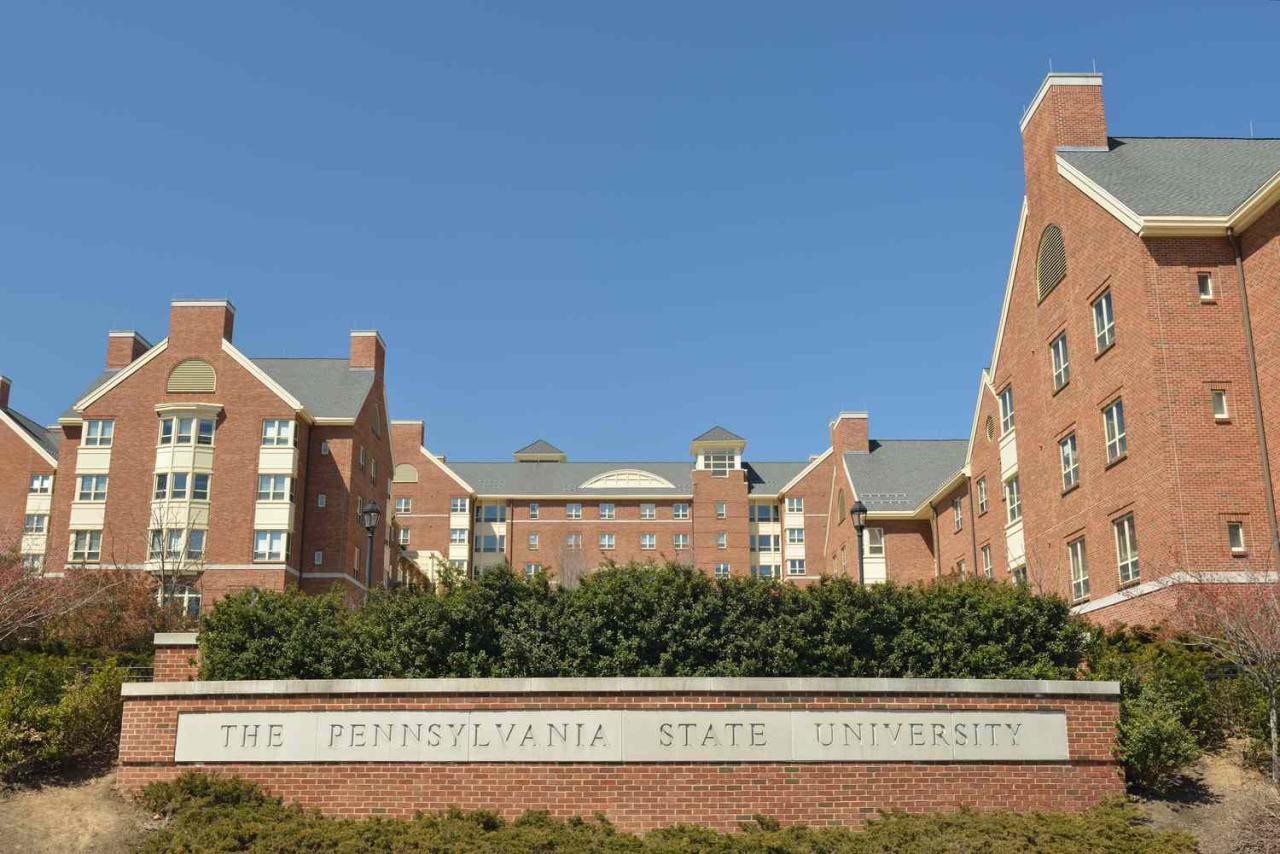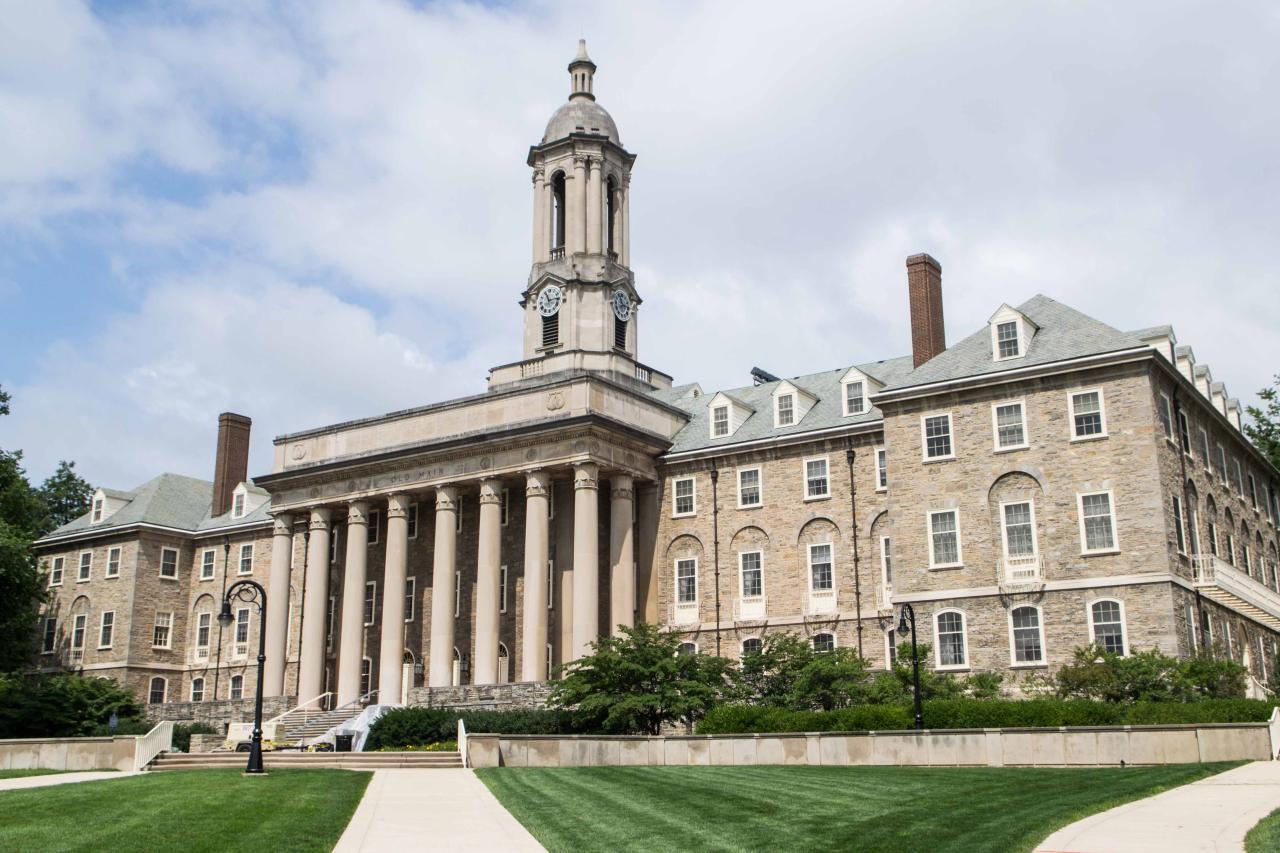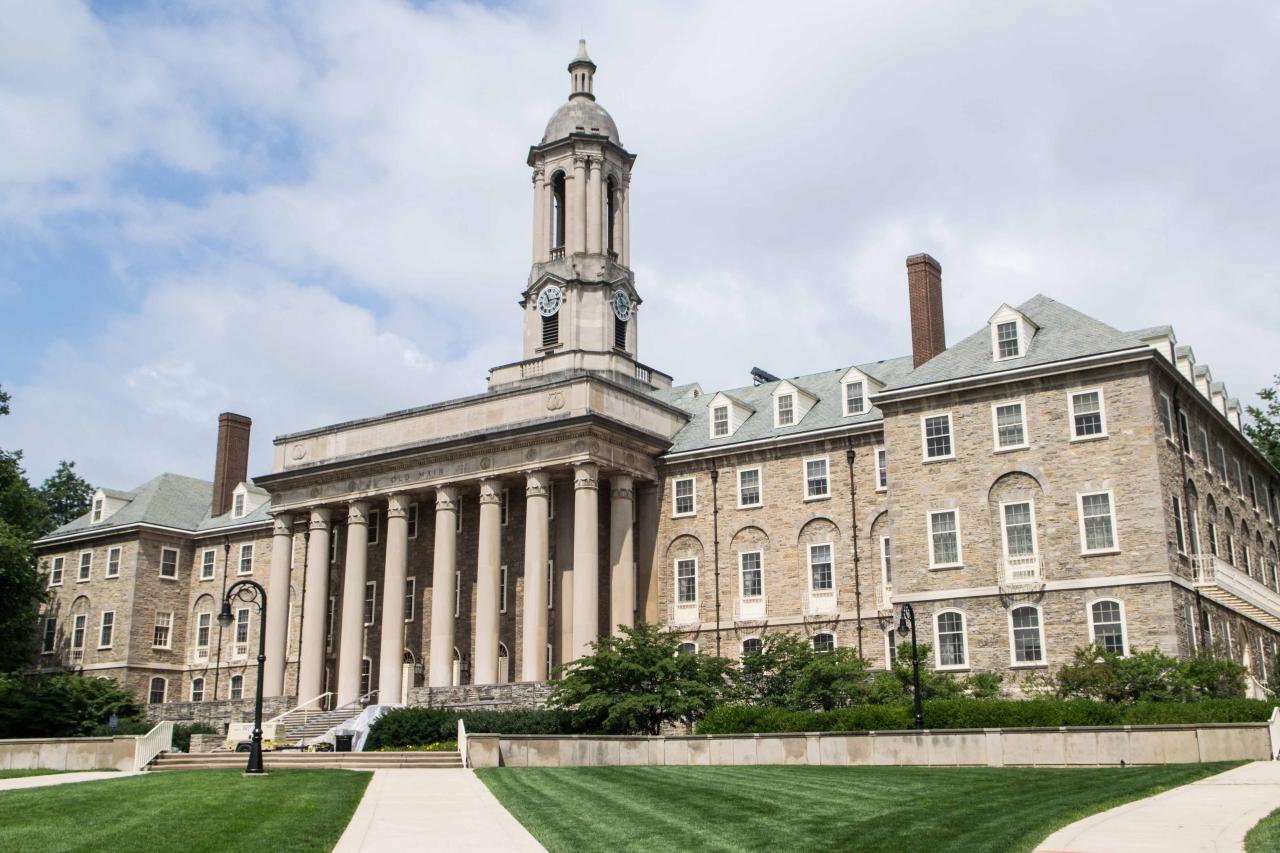Penn State University, a beacon of academic excellence, has a rich history spanning over 150 years. Founded in 1855 as the Farmers’ High School of Pennsylvania, the university has evolved into a comprehensive institution renowned for its academic programs, research, and commitment to student success. From its humble beginnings in agricultural education, Penn State has grown into a global leader in higher education, encompassing a vast network of campuses, research centers, and international partnerships.
Penn State’s dedication to research has propelled it to the forefront of innovation, with groundbreaking discoveries in fields ranging from medicine and engineering to the arts and humanities. The university’s commitment to student life fosters a vibrant campus community where students can explore their passions, develop their talents, and build lifelong connections.
Penn State University

Penn State University, commonly known as Penn State, is a public research university with a rich history and a strong commitment to academic excellence. Founded in 1855, Penn State has grown from a small agricultural college to a world-renowned institution with campuses across Pennsylvania and a global reach.
Founding and Early Years
Penn State’s origins can be traced back to the passage of the Land-Grant College Act of 1862, which established agricultural and mechanical colleges in each state. In response to this act, the Pennsylvania General Assembly chartered the Farmers’ High School of Pennsylvania in 1855. The school’s initial mission was to provide practical education in agriculture, mechanical arts, and military science, with a focus on preparing students for careers in these fields.
The first classes were held in a rented building in Bellefonte, Pennsylvania, with a faculty of four and a student body of 69. The school’s early years were marked by financial challenges and a lack of permanent facilities. However, the dedication of its faculty and the support of local farmers helped the school to survive and thrive.
Key Historical Milestones, Penn state university
- 1863: The school was renamed the Agricultural College of Pennsylvania.
- 1865: The school moved to its current location in State College, Pennsylvania, and began construction of its first permanent building, Old Main.
- 1887: The school became the Pennsylvania State College, reflecting its expanded curriculum and growing reputation.
- 1953: The school became Penn State University, recognizing its status as a comprehensive research institution.
- 1960s-1970s: Penn State experienced significant growth, with the establishment of new campuses across the state and the expansion of its academic programs.
- 1980s-1990s: Penn State continued to grow its research enterprise and established itself as a leader in fields such as engineering, medicine, and agriculture.
- 2000s-Present: Penn State has continued to innovate and adapt to the changing landscape of higher education, embracing new technologies and expanding its global reach.
Impact of Key Figures
- Evan Pugh: Penn State’s first president, Pugh played a critical role in shaping the school’s early development and establishing its academic standards.
- George W. Atherton: Atherton served as president of Penn State from 1882 to 1906, during a period of significant growth and expansion. He oversaw the construction of many new buildings and the establishment of new academic programs.
- Milton S. Eisenhower: Eisenhower served as president of Penn State from 1950 to 1956. During his tenure, the school became Penn State University, reflecting its status as a comprehensive research institution. He also oversaw the establishment of the Penn State College of Medicine.
- Joab L. Thomas: Thomas served as president of Penn State from 1960 to 1970, during a period of rapid growth and change. He oversaw the establishment of several new campuses and the expansion of the university’s academic programs.
Athletics and Traditions: Penn State University
Penn State University boasts a rich athletic heritage and vibrant traditions that deeply connect its students, alumni, and the broader community. Athletics play a central role in shaping the university’s identity, fostering a strong sense of pride and belonging among its members.
Penn State’s Athletic Prowess
Penn State is a prominent member of the Big Ten Conference, known for its competitive spirit and impressive athletic achievements. The university fields 31 varsity sports teams, including football, basketball, soccer, volleyball, and many others.
- The Penn State Nittany Lions football team has a long and storied history, having won numerous national championships and conference titles. Notably, they secured the 1982 and 1986 national championships under legendary coach Joe Paterno.
- The men’s basketball team has also enjoyed significant success, reaching the NCAA Tournament on multiple occasions. In 2011, they advanced to the Elite Eight under coach Ed DeChellis.
- Beyond football and basketball, Penn State has produced numerous Olympic athletes and professional sports stars across various disciplines.
Iconic Traditions and Rituals
Penn State’s traditions and rituals are deeply ingrained in the university’s culture and are celebrated by generations of students, alumni, and fans. These traditions create a sense of unity and belonging, fostering a strong connection to the university.
- The Nittany Lion mascot is a beloved symbol of Penn State, representing strength, courage, and pride. The Nittany Lion’s roar is a familiar sound at sporting events and university gatherings.
- The “We Are…Penn State!” cheer is a powerful and unifying chant that resonates throughout the university community. It is a call to action, reminding everyone of their shared identity and commitment to Penn State.
- The “S-Zone” is a designated student section at football games, known for its enthusiastic support and vibrant atmosphere. Students in the S-Zone create a sea of blue and white, cheering on the Nittany Lions with unwavering passion.
Athletics and Community Building
Athletics at Penn State play a crucial role in fostering a sense of community and belonging among students, alumni, and the broader community. Sporting events provide opportunities for people to come together, celebrate their shared identity, and create lasting memories.
- Penn State’s athletic teams have a large and dedicated fan base, with alumni and students traveling from across the country to support their favorite teams. This shared passion for athletics creates a strong sense of community and connection.
- The university’s athletic programs also promote physical activity and healthy lifestyles, encouraging students and members of the community to participate in sports and recreational activities.
- Through its athletic programs, Penn State provides opportunities for students to develop leadership skills, teamwork, and a strong work ethic, qualities that are valuable in all aspects of life.
Penn State’s Global Presence

Penn State’s commitment to global engagement extends far beyond its borders, fostering meaningful connections and collaborations with universities and institutions around the world. The university recognizes the importance of international understanding and actively promotes it through various initiatives, creating a dynamic environment that benefits its students, faculty, and research endeavors.
International Partnerships and Collaborations
Penn State actively seeks out and develops international partnerships and collaborations, recognizing the mutual benefits of such exchanges. These partnerships enhance research, teaching, and learning opportunities, fostering a global perspective among students and faculty. The university collaborates with institutions across various disciplines, including:
- Research collaborations: Penn State researchers engage in joint research projects with international counterparts, addressing global challenges in areas like climate change, healthcare, and sustainable development. For example, the university’s collaboration with the University of Oxford on a project studying the impact of climate change on agricultural production in developing countries has yielded significant insights.
- Student exchange programs: Penn State offers numerous exchange programs that allow students to study abroad at partner universities, enriching their academic experiences and broadening their global perspectives. The university has exchange agreements with over 300 institutions in 60 countries, providing students with diverse options to explore different cultures and educational systems.
- Faculty collaborations: Penn State faculty members engage in joint research, teaching, and scholarly activities with international colleagues, fostering intellectual exchange and cross-cultural understanding. These collaborations often lead to the development of new research initiatives, joint publications, and innovative teaching methods.
Global Education Initiatives
Penn State’s commitment to global education is evident in its various initiatives designed to promote international understanding and prepare students for a globalized world. These initiatives include:
- Study abroad programs: Penn State offers a wide range of study abroad programs, providing students with the opportunity to immerse themselves in different cultures, learn new languages, and gain valuable international experience. The university’s study abroad programs are designed to enhance students’ academic and personal growth, preparing them for successful careers in a globalized marketplace.
- International student support: Penn State provides comprehensive support services to international students, helping them adjust to life in the United States and navigate the academic and cultural challenges they may encounter. The university’s International Student and Scholar Services office offers a range of resources, including visa assistance, cultural orientation programs, and academic advising.
- Global citizenship curriculum: Penn State incorporates global citizenship themes into its curriculum, encouraging students to develop a critical understanding of global issues and their impact on diverse communities. This approach fosters students’ awareness of global interconnectedness and prepares them to become responsible citizens in a globalized world.
Impact of Penn State’s Global Presence
Penn State’s global presence has a profound impact on its students, faculty, and research, shaping the university’s academic landscape and fostering a dynamic environment for learning and discovery. The university’s international partnerships and collaborations:
- Enhance research opportunities: By engaging in joint research projects with international counterparts, Penn State researchers gain access to diverse perspectives, expertise, and resources, leading to innovative discoveries and groundbreaking advancements in various fields.
- Broaden student perspectives: Study abroad programs and international exchange initiatives provide students with invaluable opportunities to experience different cultures, learn new languages, and gain a deeper understanding of global issues. This exposure fosters their personal and academic growth, preparing them for careers in a globalized world.
- Foster international understanding: Penn State’s global engagement promotes cross-cultural understanding and collaboration, fostering a sense of interconnectedness among students, faculty, and researchers. This exchange of ideas and perspectives contributes to a more inclusive and globally aware university community.
Penn State in the Future
Penn State University, with its rich history and commitment to innovation, is poised to play a pivotal role in shaping the future of higher education and research. The university’s ability to adapt to evolving societal needs and leverage emerging technologies will be crucial in its continued success.
Impact of Emerging Technologies
The rapid advancements in artificial intelligence (AI), data science, and other emerging technologies will significantly impact Penn State’s operations and mission. The university is already actively incorporating these technologies into its curriculum and research initiatives. For example, the development of AI-powered learning platforms will personalize education and provide students with tailored learning experiences. Data science will enable researchers to analyze vast datasets and gain insights into complex problems, driving innovation in fields like healthcare, agriculture, and environmental science.
Global Trends and University’s Role
Penn State’s commitment to global engagement will continue to be a defining factor in its future success. The university will need to navigate a world characterized by globalization, technological advancements, and demographic shifts. Its international partnerships, study abroad programs, and research collaborations will play a crucial role in addressing global challenges and fostering cross-cultural understanding.
Penn State’s Role in Shaping the Future of Education and Research
Penn State is uniquely positioned to be a leader in shaping the future of education and research. Its focus on interdisciplinary learning, research excellence, and community engagement will be essential in addressing the complex challenges facing society. The university will continue to attract top talent and resources, fostering innovation and breakthroughs across various disciplines.
Final Review
Penn State University stands as a testament to the power of education and the transformative impact it has on individuals and society. As it continues to evolve and adapt to the changing world, Penn State remains steadfast in its mission to educate future leaders, advance knowledge, and serve the public good. With a legacy of excellence and a vision for the future, Penn State University will undoubtedly continue to shape the lives of generations to come.
Penn State University, known for its strong academic programs and vibrant campus life, is a popular destination for students from all over the world. While navigating the academic landscape, students also need to consider essential aspects like health insurance, and for that, first acceptance insurance offers a range of plans that can provide peace of mind.
With reliable insurance coverage, Penn State students can focus on their studies and extracurricular activities, knowing they have a safety net in place.
